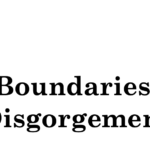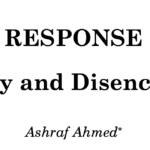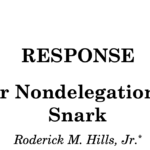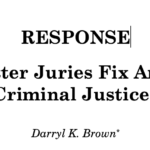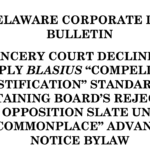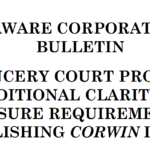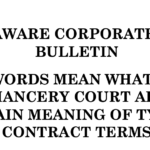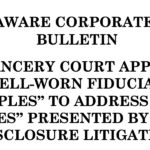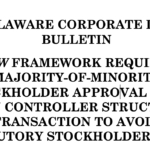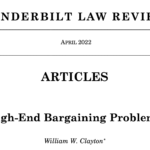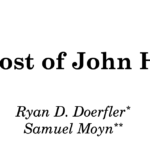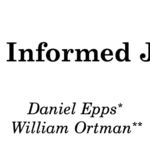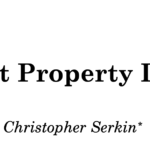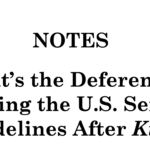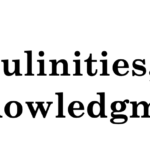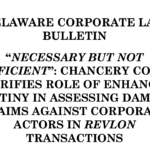Volume 75 Category
Finding the Boundaries of Equitable Disgorgement
May. 18, 2022—Cameron K. Hood | 75 Vand. L. Rev. 1307 (2022) | The disgorgement of “ill-gotten gains” is a significant mechanism for enforcing the securities laws. By compelling a violator of the securities laws to forfeit their illegal proceeds, disgorgement serves as a strong deterrent for securities fraud and an important method by which investors are compensated...
Democracy and Disenchantment
May. 17, 2022—Ashraf Ahmed | 75 Vand. L. Rev. En Banc 223 (2022) | This piece is a response to Ryan D. Doerfler & Samuel Moyn, The Ghost of John Hart Ely, 75 VAND. L. REV 769 (2022). The Ghost of John Hart Ely is Doerfler and Moyn’s latest salvo against American judicial review. This time, however, their...
Hunting for Nondelegation Doctrine’s Snark
May. 17, 2022—Roderick M. Hills, Jr. | 75 Vand. L. Rev. En Banc 215 (2022) | This piece is a response to Ben Silver, Nondelegation in the States, 75 VAND. L. REV. 1211, 1221 (2022). There is much to like about Silver’s article: it is analytically sharp, doctrinally comprehensive, and written with clarity and grace. Moreover, on...
Can Better Juries Fix American Criminal Justice?
May. 17, 2022—Darryl K. Brown | 75 Vand. L. Rev. En Banc 205 (2022) | This piece is a response to Daniel Epps & William Ortman, The Informed Jury, 75 VAND. L. REV. 823 (2022). Professors Daniel Epps and William Ortman argue that it could. In their Article The Informed Jury, Epps and Ortman propose that trial...
CHANCERY COURT DECLINED TO APPLY BLASIUS “COMPELLING JUSTIFICATION” STANDARD IN SUSTAINING BOARD’S REJECTION OF OPPOSITION SLATE UNDER “COMMONPLACE” ADVANCE NOTICE BYLAW
May. 12, 2022—Robert S. Reder & Gabrielle M. Haddad | 75 Vand. L. Rev. En Banc 195 (2022) | Under § 141(a) of the Delaware General Corporation Law (“DGCL”), “the business and affairs of every corporation . . . shall be managed by or under the direction of a board of directors . . . .” In light of this sweeping grant of authority to...
CHANCERY COURT PROVIDES ADDITIONAL CLARITY ON DISCLOSURE REQUIREMENTS FOR ESTABLISHING CORWIN DEFENSE
May. 12, 2022—Robert S. Reder & Stanley N. Medlin | 75 Vand. L. Rev. En Banc 187 (2022) | At the other end of the spectrum, as explained by Vice Chancellor Sam Glasscock III in Galindo v. Stover, CA No. 2021-0031-SG (Del. Ch. Jan. 26, 2022) (“Galindo”), “directors need not provide exhaustive information in seeking a stockholder...
THE WORDS MEAN WHAT THEY SAY: CHANCERY COURT ADHERES TO PLAIN MEANING OF TYPICAL CONTRACT TERMS
May. 12, 2022—Robert S. Reder & Paul W. d’Ambrosio | 75 Vand. L. Rev. En Banc 179 (2022) | In Yatra Online, Inc. v. Ebix, Inc., C.A. No. 2020-0444-JRS (Del. Ch. Aug. 30, 2021), Vice Chancellor Joseph R. Slights III ruled that a merger agreement provision stating “there shall be no liability on the part of any...
CHANCERY COURT APPLIES “WELL-WORN FIDUCIARY PRINCIPLES” TO ADDRESS “NOVEL ISSUES” PRESENTED BY SPAC DISCLOSURE LITIGATION
May. 12, 2022—Robert S. Reder | 75 Vand. L. Rev. En Banc 167 (2022) | In In Re MultiPlan Corp. S’holders Litig., 268 A.3d 784 (Del. Ch. 2022) (“MultiPlan”), the Delaware Court of Chancery (“Chancery Court”) confronted—for the first time—litigation over one of the most popular devices currently available to privately-held businesses seeking “to access the public...
MFW FRAMEWORK REQUIRES MAJORITY-OF-MINORITY STOCKHOLDER APPROVAL EVEN WHEN CONTROLLER STRUCTURES TRANSACTION TO AVOID STATUTORY STOCKHOLDER VOTE
May. 12, 2022—Robert S. Reder | 75 Vand. L. Rev. En Banc 157 (2022) | In Berteau v. Glazek, C.A. No. 2020-0873-PAF (Del. Ch. June 30, 2021) (“Berteau”), Vice Chancellor Paul A. Fioravanti, Jr. of the Delaware Court of Chancery (“Chancery Court”) confronted a “novel,” but ultimately “unpersuasive,” theory concerning the judicial standard of review applicable to...
High-End Bargaining Problems
Apr. 21, 2022—William W. Clayton | 75 Vand. L. Rev. 703 (2022) | Many important areas of the law place great confidence in the ability of contracting parties to bargain effectively. In this Article, I question the wisdom of a formalistic faith in bargaining by identifying flaws in the bargaining process at the high end of the market,...
The Ghost of John Hart Ely
Apr. 21, 2022—Ryan D. Doerfler & Samuel Moyn | 75 Vand. L. Rev. 769 (2022) | The ghost of John Hart Ely haunts the American liberal constitutional imagination. Despite the failure long ago of any progressive constitutional vision in an increasingly conservative Supreme Court, Ely’s conjectures about the superiority of judges relative to legislatures in the protection of...
The Informed Jury
Apr. 21, 2022—Daniel Epps & William Ortman | 75 Vand. L. Rev. 823 (2022) | The right to a criminal jury trial is a constitutional disappointment. Cases almost never make it to a jury because of plea bargaining. In the few cases that do, the jury is relegated to a narrow factfinding role that denies it normative voice...
What Property Does
Apr. 21, 2022—Christopher Serkin | 75 Vand. L. Rev. 891 (2022) | For centuries, scholars have wrestled with seemingly intractable problems about the nature of property. This Article offers a different approach. Instead of asking what property is, it asks what property does. And it argues that property protects people’s reliance on resources by moderating the pace of...
What’s the Deference? Interpreting the U.S. Sentencing Guidelines After Kisor
Apr. 21, 2022—Liam Murphy | 75 Vand. L. Rev. 957 (2022) | For more than three decades, the U.S. Sentencing Guidelines have constrained the punishment doled out by federal judges, limiting discretion that was once nearly unlimited and bringing standardization to the penological decisionmaking process. For twice as long, the Supreme Court has constrained judges in a different...
Policing, Masculinities, and Judicial Acknowledgment
Apr. 21, 2022—Nicholas J. Prendergast | 75 Vand. L. Rev. 997 (2022) | In the 1980s, the Supreme Court held that courts must consider the “totality of the circumstances” when deciding the reasonableness of a police officer’s conduct in an excessive force suit. To this day, the precise meaning of “reasonableness” remains elusive. For years, courts around the...
“NECESSARY BUT NOT SUFFICIENT”: CHANCERY COURT CLARIFIES ROLE OF ENHANCED SCRUTINY IN ASSESSING DAMAGES CLAIMS AGAINST CORPORATE ACTORS IN REVLON TRANSACTIONS
Apr. 11, 2022—Robert S. Reder & Connor J. Breed | 75 Vand. L. Rev. En Banc 145 (2022) | Also explains that preliminary steps taken by self-interested corporate officers to tilt playing field for benefit of favored bidder may invite application of Revlon principles several months before board approval of sale transaction. PDF Download Link AUTHORS: Robert...
